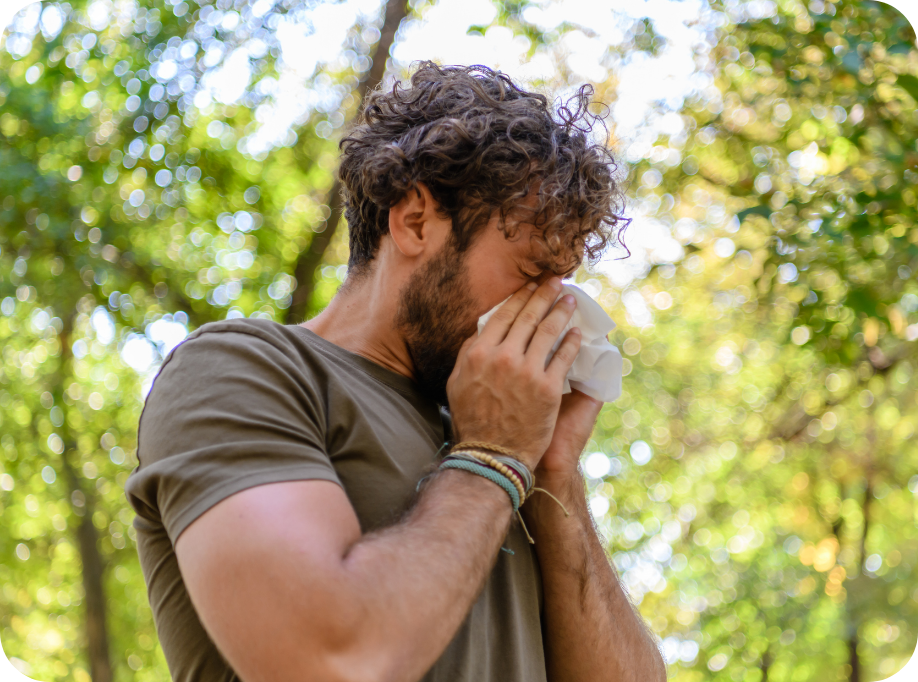

What Are Allergies?
Allergies are immune system responses to substances that are typically harmless but are perceived by the body as threats. These substances, known as allergens, can trigger a range of allergic reactions when they come in contact with the body. Allergies are common and can affect people of all ages.
Are There Different Types of Allergies?
There are many specific types of allergies. Learn more about the different varieties of allergies that we treat below.
What Are Allergy Symptoms?
Allergies can manifest in various ways, with individuals experiencing a range of common signs and symptoms depending on the type of allergy they are experiencing. Here are some of the most common indicators:
Itchy Eyes
Allergic reactions often lead to itchy, watery eyes. This is a common symptom of environmental allergies.
Sneezing
Frequent sneezing is a common allergic response, often triggered by allergens, such as pollen or pet dander.
Rhinorrhea
Allergies can cause excess mucus production, resulting in a persistent runny nose or nasal congestion.
Coughing
Is coughing a symptom of allergies? Allergic rhinitis can lead to coughing either via postnasal drip or triggering asthma.
Skin Rashes
Both environmental and food allergens can lead to skin rashes, such as eczema, urticaria (hives) and angioedema (swelling).
Fatigue
Individuals suffering from year-round and/or seasonal allergies often experience fatigue as the immune system is “overreacting” to the environment and unnecessarily expending energy.
What Causes Allergies? Common Causes of Allergies
Allergies occur when the immune system reacts excessively to usually harmless substances, such as pollen, pet dander, foods, medications, and insect stings. Family history (genetics) and environmental factors play a role in the development of allergies.
Common allergy triggers include:

Diagnosing And Treating Allergies
Allergy Testing in New Jersey
There are several types of skin and blood tests that can be used to diagnose allergies. Learn more about the types of testing available for allergies below.
Allergy Treatment in New Jersey
Although allergy avoidance is the most common treatment for all types of allergies to minimize exposure to the allergen, there are several other options based on the type of allergy. Learn more about some of the types of treatments available below.
Frequently Asked Questions About Allergies
Why do I have allergies?
Certain individuals have a genetic predisposition to develop allergies. However, environmental exposure also plays an important role in developing allergy symptoms.
What is the best way to treat allergies?
Avoidance is the best way to treat allergies. If avoidance is not reasonable or does not result in a significant improvement, then medications and/or allergen immunotherapy are considered.
Can the same allergic triggers result in different symptoms for different people?
Yes, allergic triggers can result in varying symptoms. For example, in some individuals an allergy to dust mites might only cause allergic rhinoconjunctivitis and present with a runny nose, nasal congestion and itchy watery eyes. In other individuals, it might result in atopic dermatitis (eczema).
When do I consider allergy shots?
Allergy shots are considered for patients who meet the following criteria:
- Symptoms have a significant negative impact on quality of life
- Symptoms are not controlled with appropriate medications or patients have adverse effects from the medications
- Patient is unable to avoid the allergic trigger or despite avoidance, still has troubling symptoms
- Patient prefers not to be on medications
- Patient who experiences complications from their allergies such as chronic sinusitis, asthma or atopic dermatitis
Can a person develop new allergies throughout life?
Yes, adults can develop new allergies at any stage of life.
Should I be tested for “everything” just to be safe?
No, testing for everything is not recommended. Allergy testing is performed based on clinical history. In addition, there can be false positives on allergy skin and blood testing.
Do children inherit the same allergies as their parents?
No. However, they do inherit the predisposition to inherit allergies in general.

